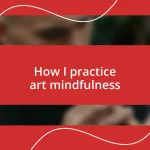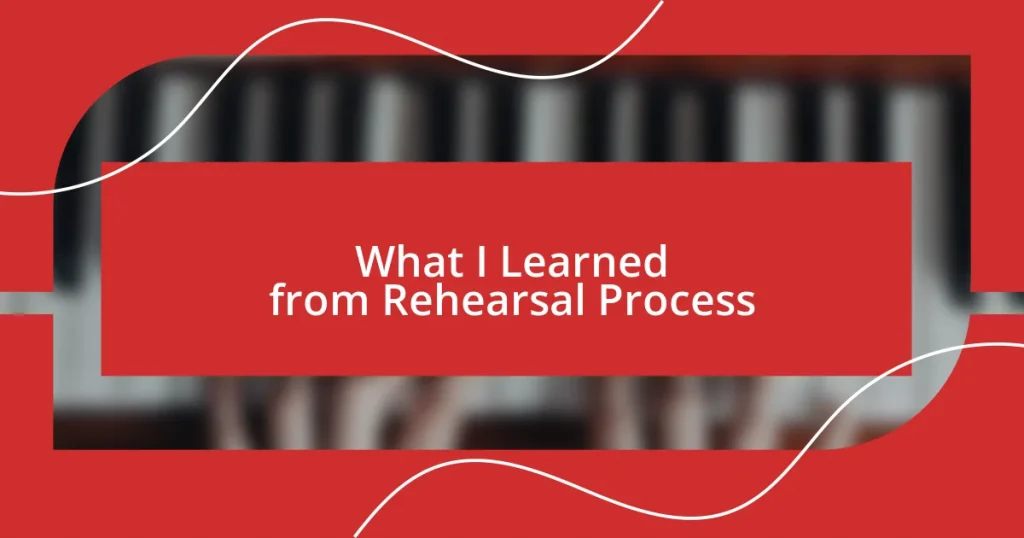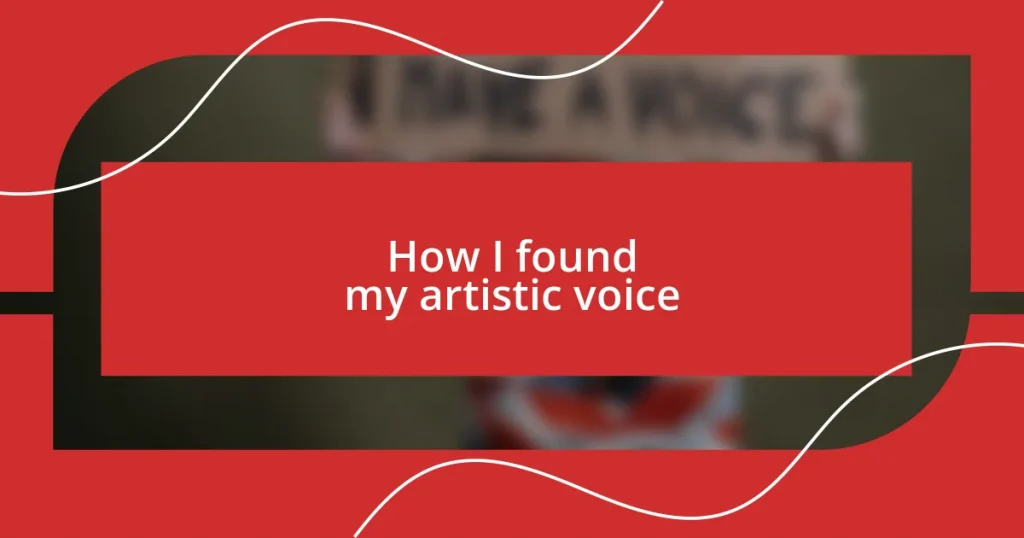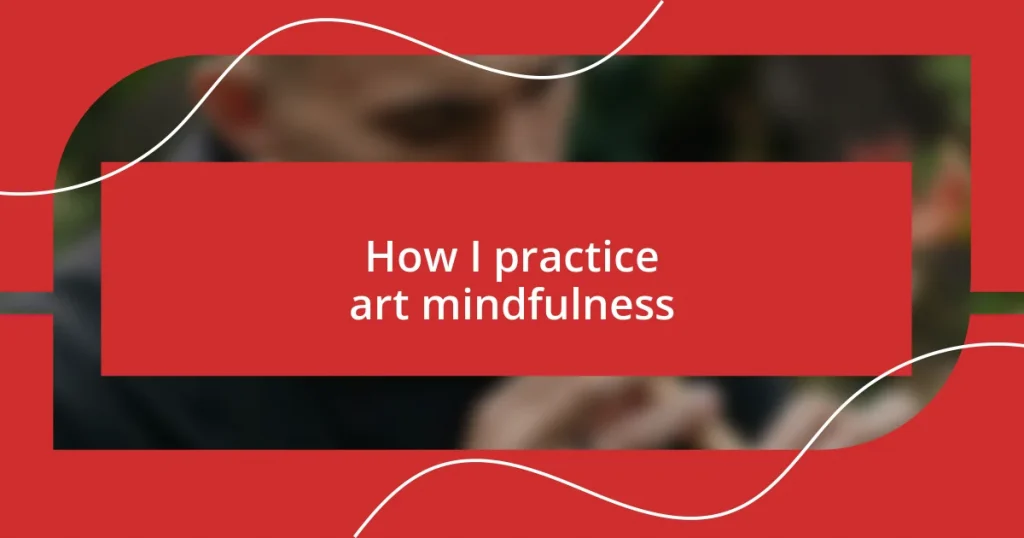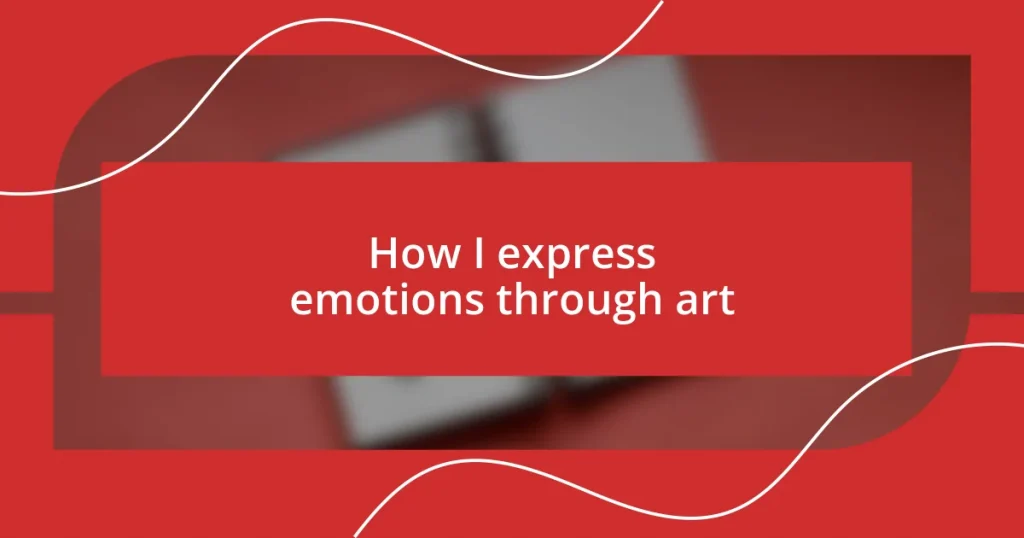Key takeaways:
- The rehearsal process is collaborative, emphasizing trust and open dialogue, which fosters creativity and deeper emotional connections among performers.
- Preparation is crucial for successful rehearsals, as it enhances confidence, reduces stress, and improves group morale, allowing for more dynamic performances.
- Embracing feedback and vulnerability leads to personal growth, prompting performers to refine their craft and explore raw emotions, which ultimately enhances their performances.
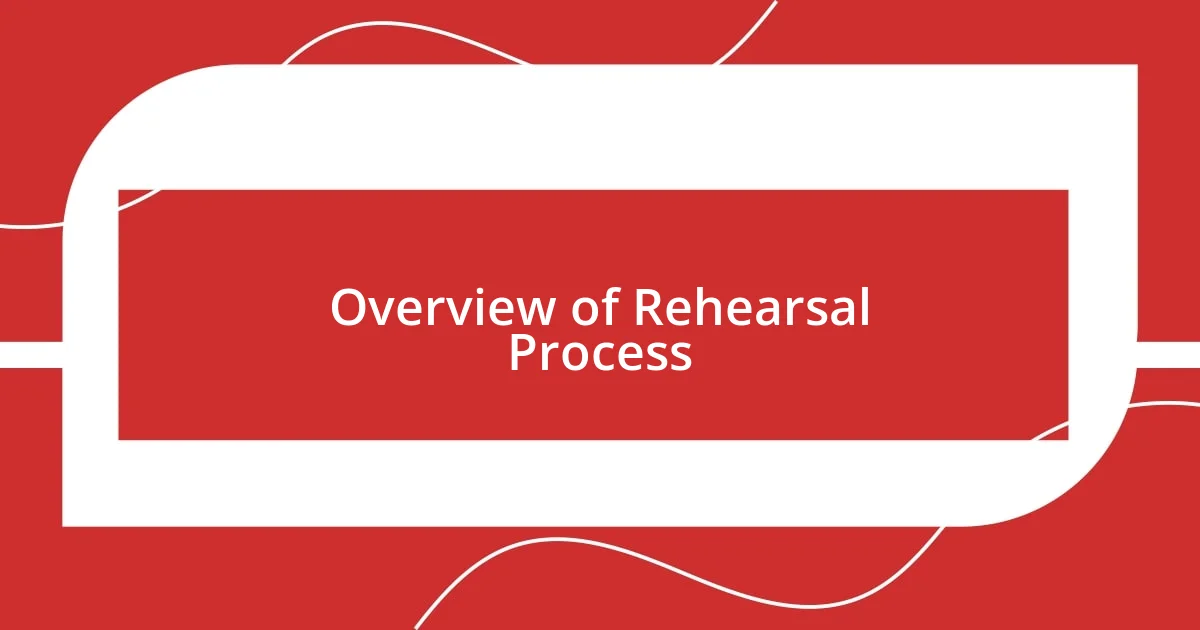
Overview of Rehearsal Process
The rehearsal process is a transformative journey that allows performers to delve deep into their characters and narratives. I vividly remember the first time I took part in an intensive rehearsal; the energy in the room was palpable. It felt like we were sculpting something beautiful together, each moment adding layers to our performance.
During rehearsals, every read-through and blocking session unveils new dynamics. Have you ever noticed how a simple pause can shift the entire tone of a scene? That realization hit me during a rehearsal when a colleague paused just before delivering a crucial line. It changed not only her delivery but also the audience’s anticipation—it was thrilling.
Ultimately, the rehearsal process is about collaboration and trust. I’ve often found that sharing vulnerabilities—whether through improvisation or addressing difficult scenes—leads to breakthroughs. This open dialogue fosters an environment where creativity thrives, reminding us that we’re all in this together, each bringing our unique contributions to the collective picture.
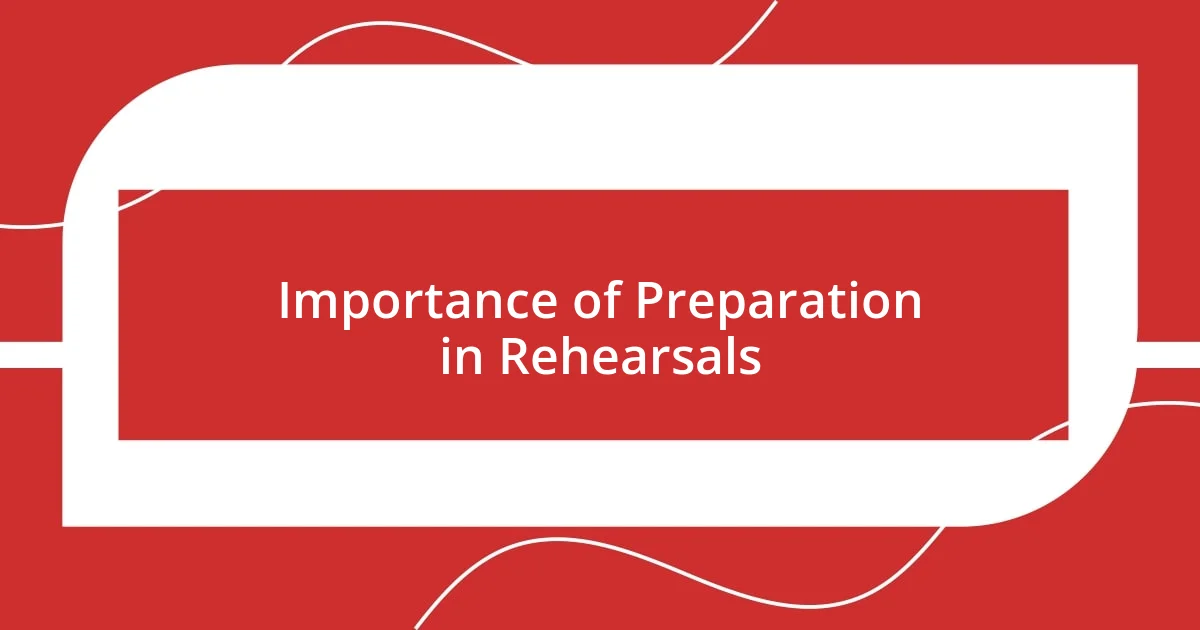
Importance of Preparation in Rehearsals
Preparation sets the stage for success in any rehearsal. From my experience, when I walk into a rehearsal knowing my lines and having an understanding of the blocking, I feel more confident and free to explore my character. It transforms the experience from mere practice into a dynamic collaboration, where we can experiment without the pressure of figuring it all out on the spot.
- A strong foundation allows for greater creativity and spontaneity.
- Prepared performers contribute to the group’s confidence, reducing stress.
- Familiarity with material enables deeper emotional connections, enhancing performances.
I recall one particular rehearsal where several cast members struggled with their lines. The atmosphere grew tense, and I could sense the discomfort. However, after a quick review session, the energy shifted dramatically. It was a powerful reminder that preparation also impacts the group’s morale—when we all contribute prepared, we elevate each other’s performances, creating a more cohesive production.
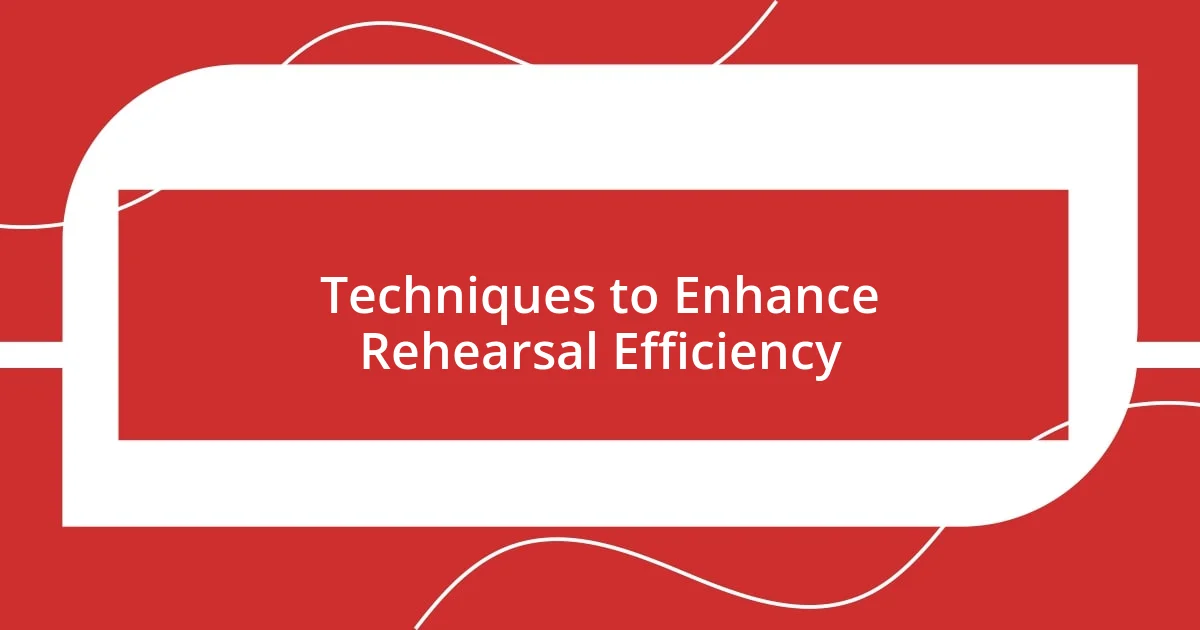
Techniques to Enhance Rehearsal Efficiency
When I think about enhancing rehearsal efficiency, one technique that stands out is the use of focused warm-ups. I remember a time when our director introduced vocal and physical exercises before diving into the day’s work. This not only energized the cast but also aligned our collective mindset. It was like tuning a musical instrument; suddenly, the notes we performed felt more precise and harmonious.
Another valuable technique is breaking the rehearsal into manageable sections. In one of my previous productions, we often rehearsed in short, focused bursts of 30 minutes, followed by brief discussions. This method allowed us to dive deep into specific scenes while keeping our energy high. I noticed that by doing this, we could absorb feedback better and make quicker adjustments, creating an environment where innovation flourished.
Lastly, using visual aids can drastically improve rehearsal outcomes. I once integrated simple props and pictures to complement our discussions. Illustrating concepts visually made it easier for everyone to grasp complex ideas, fostering a quicker learning curve. It’s fascinating how something as simple as a storyboard can clarify intentions and enhance our connection to the material.
| Technique | Description |
|---|---|
| Focused Warm-ups | Engaging in vocal and physical exercises to align and energize the cast prior to rehearsals. |
| Segmented Rehearsals | Breaking rehearsals into short, focused sections to maintain energy and improve learning retention. |
| Visual Aids | Incorporating storyboards and props to clarify concepts and enhance understanding. |
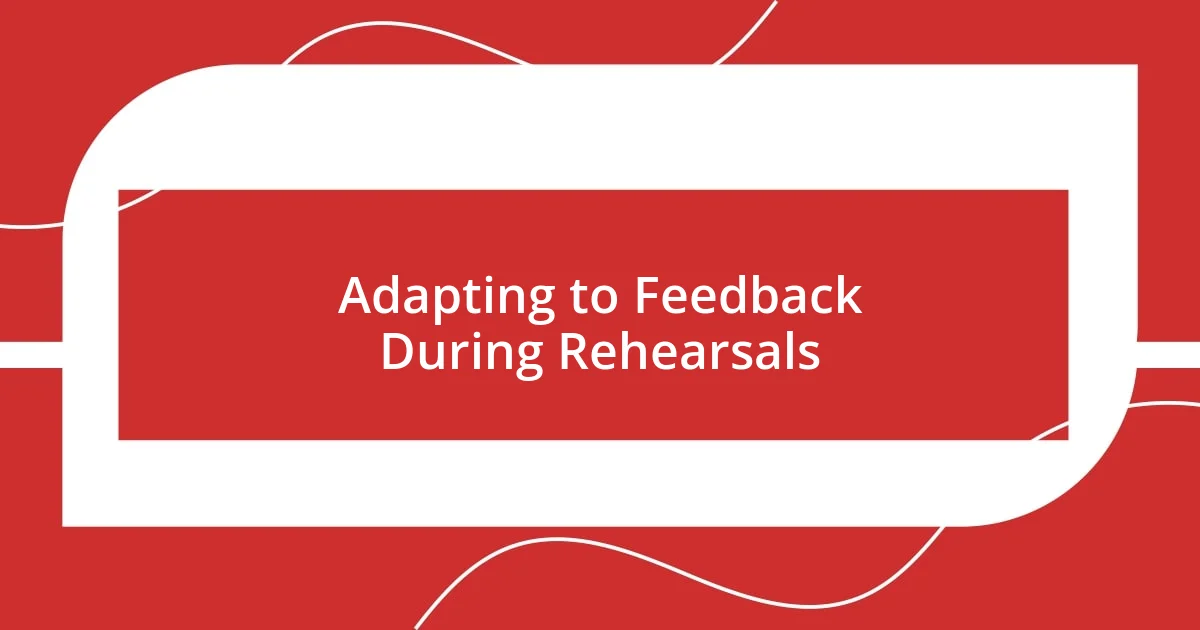
Adapting to Feedback During Rehearsals
During rehearsals, I’ve learned the importance of being open to feedback; it’s a vital part of our growth as performers. I remember a time when my director pointed out subtle nuances in my delivery that I hadn’t noticed. It felt a bit uncomfortable initially, but realizing these adjustments could elevate my performance made the process worthwhile. Instead of seeing feedback as criticism, I began viewing it as a chance to refine my craft.
Adapting to feedback requires a mindset shift. I found that asking for clarification helped tremendously. After expressing confusion about a direction given during rehearsal, I engaged in a conversation that led to deeper insights into my character’s motivation. That moment taught me that being proactive in seeking understanding not only improves my own performance but also fosters a collaborative atmosphere among cast members.
There were times when I struggled to incorporate feedback smoothly. In one rehearsal, I received suggestions for a scene that felt alien to my interpretation. It took me a moment to process, but after stepping back and experimenting with those ideas, I discovered a fresh depth to the scene I had never considered. Have you ever had a breakthrough after grappling with feedback? It’s astonishing how those challenges can unfold into incredible moments of growth.
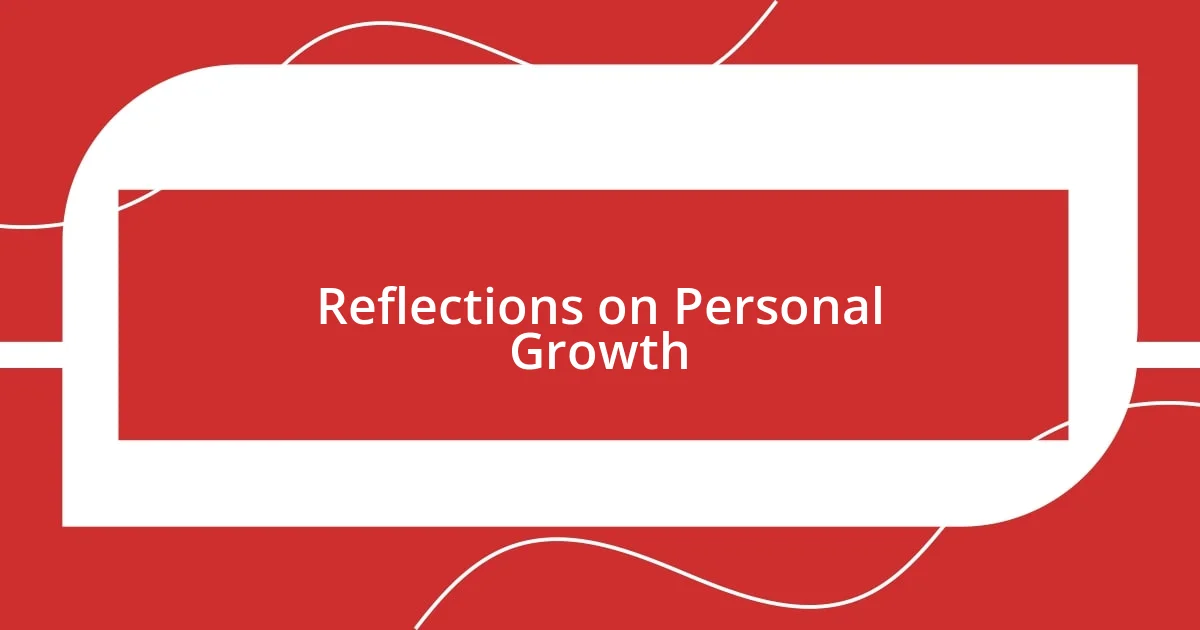
Reflections on Personal Growth
Reflecting on my personal growth during the rehearsal process, I’ve come to appreciate how embracing vulnerability is crucial. I vividly recall a rehearsal when I had to reveal my character’s innermost fears. Initially, exposing such personal emotions felt daunting, but sharing those moments with the cast fostered deeper connections. Have you ever shared something vulnerable and felt an instant bond with others? It’s in those raw, authentic exchanges that we truly grow as individuals and performers.
Trust me, the journey toward self-discovery can be both exciting and scary. There was a point in one rehearsal when I stumbled over my lines, feeling the familiar sting of embarrassment. Instead of retreating, I chose to laugh it off and use that moment to energize the room. This taught me that mistakes are not failures; they are stepping stones toward growth. How often do we let small missteps deter us? My experience showed me that vulnerability can pave the way for resilience.
I’ve also learned that reflecting on our experiences can catalyze great personal growth. After each rehearsal, I started journaling my thoughts, both the highs and the lows. One particular entry stands out – I wrote about a moment when my character’s transformation resonated deeply with me. Revisiting that reflection helped me recognize patterns in my performances and my emotional responses. Have you ever taken the time to reflect on your journey? It’s incredible how putting pen to paper can unveil layers of understanding about ourselves we had yet to discover.
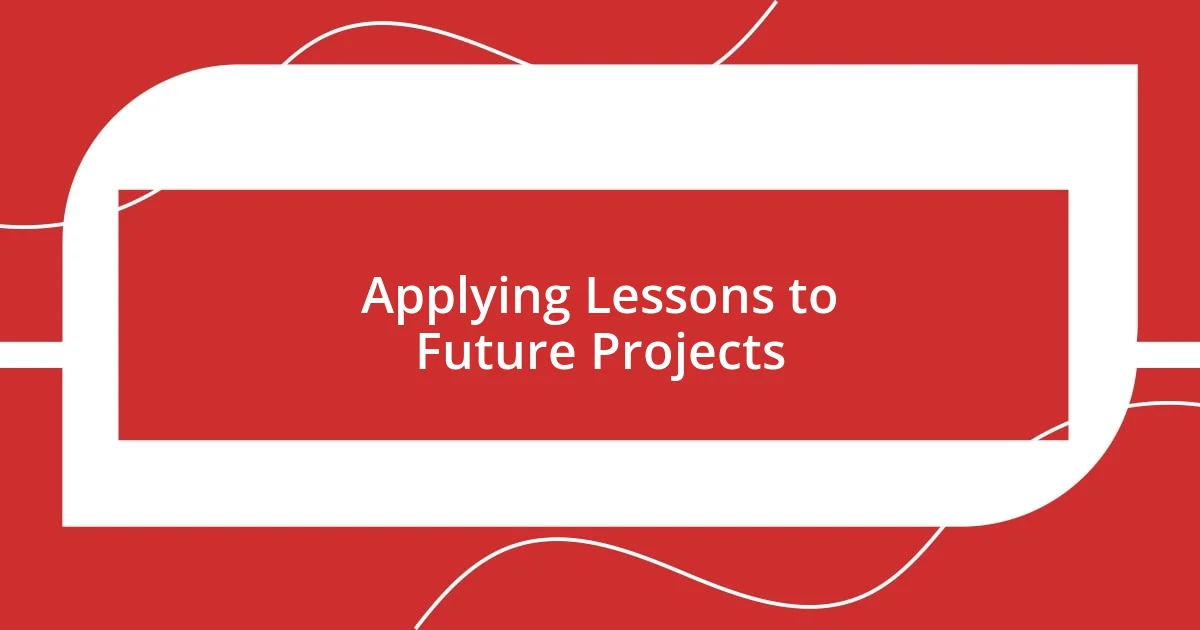
Applying Lessons to Future Projects
Applying what I’ve learned from rehearsals to future projects feels like equipping myself with a toolkit tailored just for me. For instance, I recall a particularly enlightening rehearsal where I challenged myself to integrate not just the director’s feedback but also the cast’s improvisations. This experience illuminated the beauty of collaboration. Have you ever found that your peers’ ideas added layers to your performance that you hadn’t anticipated? It’s those moments that remind me of the power of collective creativity, and I know I’ll carry this approach into my future projects.
In another instance, I remember working on a scene where I pushed the boundaries of my character’s emotional range. Initially, I felt hesitant; vulnerabilities can be hard to tap into when you’re trying to present a polished performance. Yet, as I allowed myself to embrace that raw emotion, I discovered an authenticity that resonated with the audience. This taught me that being willing to explore the uncomfortable can lead to powerful moments. Isn’t it fascinating how the willingness to be raw and genuine can transform a scene? I now prioritize this openness in every new project I undertake, believing it will enhance not just my performances but the overall impact of the work.
Lastly, I’ve come to realize the importance of ongoing self-reflection post-rehearsals. Each time I step off stage, I take a moment to assess what worked and what didn’t, digging deep into my emotional responses. There was a performance where I felt particularly proud of my character’s journey, but I later noted the points where my energy dipped. Learning from these moments has shaped how I approach each rehearsal process anew. Have you ever evaluated your own reactions to discover patterns? This self-analysis has become my compass moving forward; it guides me towards more fulfilling and impactful performances.

